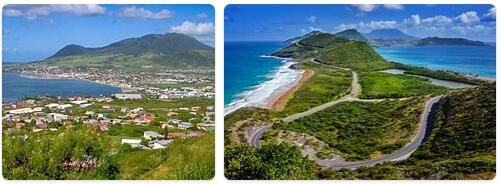All borders closed from 25 March. Entry will not be possible for anyone. For more information about coronavirus, see the section Health.
Safety
Most journeys to Saint Kitts and Nevis go safely and without special problems, but travelers should be alert and take reasonable precautions.
The crime rate is relatively low. The risk of small theft is greatest, in rare cases more violent episodes are also reported. It is recommended to dress “easily” and not show visible signs of wealth when leaving the hotel area. Take special care after dark; It is recommended not to walk alone and avoid illuminated areas. One should at all times secure his personal belongings and documents.
The terror threat is considered low in Saint Kitts and Nevis.
The hurricane season is from June to November.
There is a risk of earthquakes in the Caribbean. Before an earthquake, you may want to take precautions and be prepared for how best to respond.
Hurricanes: In the case of hurricanes, Norwegians staying in affected areas are encouraged to follow the advice and directions of local authorities. In addition, the National Hurricane Center as well as local media is a useful source of up-to-date information.
It is imperative to make preparations in advance of notified hurricanes. You should ensure that you have access to what you need to do in the immediate aftermath of hurricanes. During and after hurricanes, periods of weakened infrastructure, electricity outages, and telecommunications networks and damage to roads and buildings can occur. Restaurants and shops may be closed. In some cases it can be challenging to float water, food and cash. The Ministry of Foreign Affairs does not normally provide travel advice in connection with natural disasters.
Travel registration : Norwegian citizens staying for a shorter or longer period in the Caribbean are encouraged to register on reiseregistrering.no. This will make it easier for the embassy to get hold of you in the event of a crisis or disaster situation.
You should be aware that most tour operators offering excursions, water sports, jeep, horseback riding, etc. are not insured, and you should therefore check the terms of your insurance before undertaking such activities.
Norway is represented at an honorary consulate in Basseterre in Saint Kitts and Nevis. Responsible Norwegian Embassy is the embassy in Havana, Cuba. Contact information for the consulate can be found here.
In case of crisis or emergency, the public is requested to contact the Norwegian Embassy in Havana:
The Norwegian Embassy in Havana
Calle 21 # 307 e/H e In
Vedado
Cuidad de La Habana
Cuba
Tel: +53 7 842 7100
Tel. from Norway: 23 95 23 00
E-mail: emb.havana@mfa.no
The opening hours of the embassy are Monday to Thursday from 08:30 to 16:30 and Friday from 08.30 to 14:00.
Outside the embassy’s opening hours, the UD’s 24-hour operating center can be contacted on tel: +47 23 95 00 00 or by e-mail: UDops@mfa.no

Entry
Please note that entry regulations may change. The Foreign Service is not responsible if the following information on entry regulations or visa requirements is changed at short notice. It is the responsibility of the traveler to ensure that travel documents are valid for entry and to familiarize themselves with the current entry rules for each country.
Norwegians travel visa-free to Saint Kitts and Nevis for shorter stays of up to 90 days. Please note that the passport must be valid for a minimum of six months after departure and that you may be asked to present your return ticket.
For other types of visas contact Saint Kitts and Nevis Embassy in London.
Health
Coronavirus (covid-19): All borders closed from 25 March. Entry will not be possible for anyone including their own citizens.
Closing initially until April 7. A number of measures are being implemented locally to limit the outbreak of infection.
You can find more information and guidance from the Norwegian health authorities on the website of the Norwegian Institute of Public Health. See also UD’s answers to frequently asked questions about travel and coronavirus.
***
Travelers should take common precautions to avoid being exposed to HIV/ AIDS. Travelers should take common precautions when it comes to food and drink in tropical areas.
For official health travel advice and health professional guidance for Norwegians when traveling abroad, please refer to the Norwegian Institute of Public Health.
Practical information
The currency in Saint Kitts and Nevis is the East Caribbean Dollar (XCD/EC $). 1 USD = 2.7 XCD (as of 30.06.2015), 1 NOK = 0.34 XCD (as of 30.06.2015)
Common credit cards such as Visa, Mastercard, Amex and Diners are accepted by most hotels, restaurants, shops and companies. The mains is 230 volts.
There are generally good telephone connections, and according to allcitycodes, the country code for calling Saint Kitts and Nevis is + 1-869
Emergency number: Police 911/469-3444/469-3333, fire 911/469-5391, ambulance 911
Normal opening hours: Public offices are open from 08:00 to 12:00 and 13:00 to 16:00 Monday to Friday. Banks are open from 08:00 to 14:00 Monday to Thursday and Friday until 16:00
Public holidays: January 1 (New Year’s Day), 2-3. January (Carnival), Good Friday and 1st Easter Day, May 1 (Workers’ Day), 2nd Pentecost, August 3 (Liberation Day), August 4 (Culturama), September 16 (National Heroes Day), September 19 (Independence Day)), 1st and 2nd Christmas Day
Norway is six hours ahead of Saint Kitts and Nevis (GMT -4).
The climate is tropical, but due to sea breezes it is relatively cool. The average temperature is 26 degrees. The hurricane season is from June to November.
The official language of Saint Kitts and Nevis is English.
Please note that wearing camouflage clothing is prohibited.